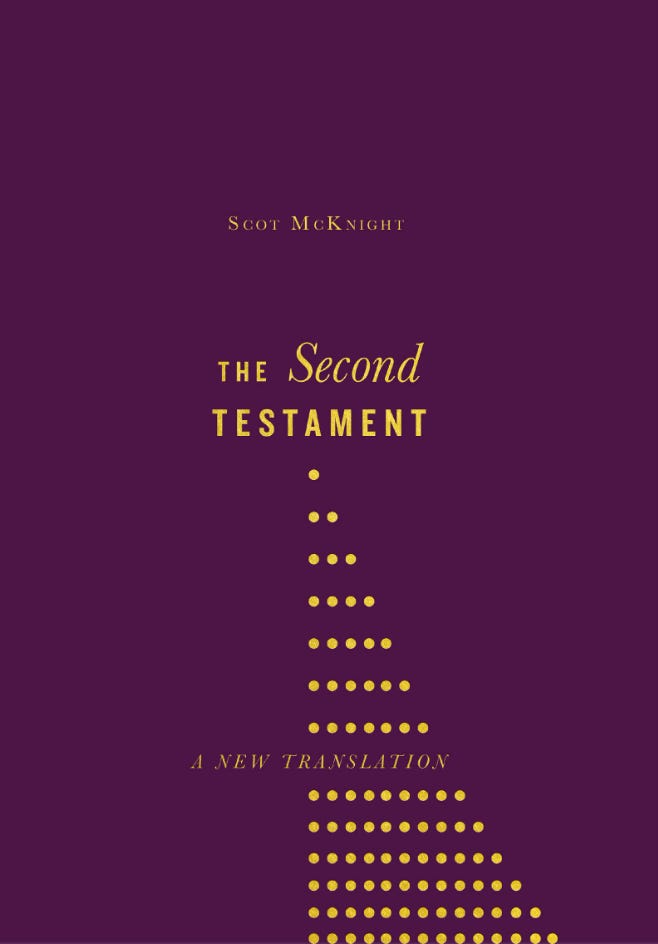If you...
What does The Second Testament attempt to accomplish? What was my intention in doing this translation? By way of reminder, it all began when I read John Goldingay’s The First Testament, which I hope everyone who reads The Second Testament will read, too. He set the tone and texture of the translation for me.
Which means it is more word-for-word than thought-for-thought, or formal than dynamic, along with all the theories outside and within those categories. It is not my theory as the opportunity to do for the New Testament what Goldingay did for the Old. Which, in a word or two, was to de-familiarize the familiar by transliterating lots of terms, avoiding theologically-laden terms, and doing what can be done to give the reader a bit of a surprise.
Please read the Preface first. I’m surprised how many do not read the Preface first. Give it a chance.
Again, What does The Second Testament attempt to accomplish? What was my intention in doing this translation?
If The Second Testament prompts your questioning if a choice of terms or expressions does what you think ought to be done, or if you raise one or two eyebrows,
or if reading a paragraph in the Gospels leads you into the world of wondering,
or if you end up considering another interpretation,
then I have achieved my intention.
And, even more, if The Second Testament prompts you into discussing a verse with a friend or your colleagues or your partner, and even more,
if it leads you to a concordance to probe the evidence,
then the translation has done its job.
If I slow you down to read the Bible more carefully… that’s what I hope happens.
Again, it is not a translation designed to correct others or to say “this is the best translation.” Rather, I hope to help you, familiar Bible reader, to know what you already know in a fresher way.
So, here are some examples:
Fresh twists
“Have you understood all these?” They say to him, “Yes.” He said to them, “Because this is true: Every Covenant-Code scholar [scribe], apprenticed in Heavens’ Empire, is comparable to a human house master who tosses out from his treasure chest new and ancient things” (Matthew 13:51-52).
After Yōannēs was given over, Yēsous came into the the Galilaia [Galilee], announcing God’s gospel and saying that “The season is filled out and the Empire has come close! Convert and be allegiant to the gospel!” (Mark 1:14-15).
A Surprise or two or three
Then the Apprentices, approaching, say to him, “Do you know that the Observant, hearing the word, were tripped up?” Responding, he said, “Every plant that my Father, the Heavenly One, doesn’t plant will be uprooted. Release them! They are sightless guides of sightless. If the sightless guide the sightless, both will fall into a pot bunker” (Matthew 15:12-14).
Using “right”
Pursue first God’s Empire and his rightness, and all these things will be added for you. Therefore, don’t disturb yourselves about tomorrow, for tomorrow will disturb itself. The evil of that day is enough for the day (Matthew 6:33).
Salvation as deliverance
Therefore, now being righted by his blood, how much more will we be delivered through him from the anger! For, if being enemies, we were reconciled with God through his Son’s death, how much more, being reconciled, we will be delivered by his life. Not only . . . but also boasting in God through our Lord Yēsous Christos, through whom now we received reconciliation (Romans 5:9-10).
Religious terms returned to their normal register
He ascends to the mountain and he calls those whom he wanted, and they departed to him. He made twelve, whom he named “Commissioners,” that they would be with him, and that he would commission them to announce 15and to have authority to toss out demons (Mark 3:13-15).




I have a quick question. Perhaps this has already been discussed. I can't find the answer in the Preface. What is the purpose of the italicized words / phrases in the Second Testament text. Do those always refer back to the First Testament or some other historical source? Thanks!
Thanks for all the hard work, Scot. We are in your debt even if some of us can read Greek (but not as well as you!).